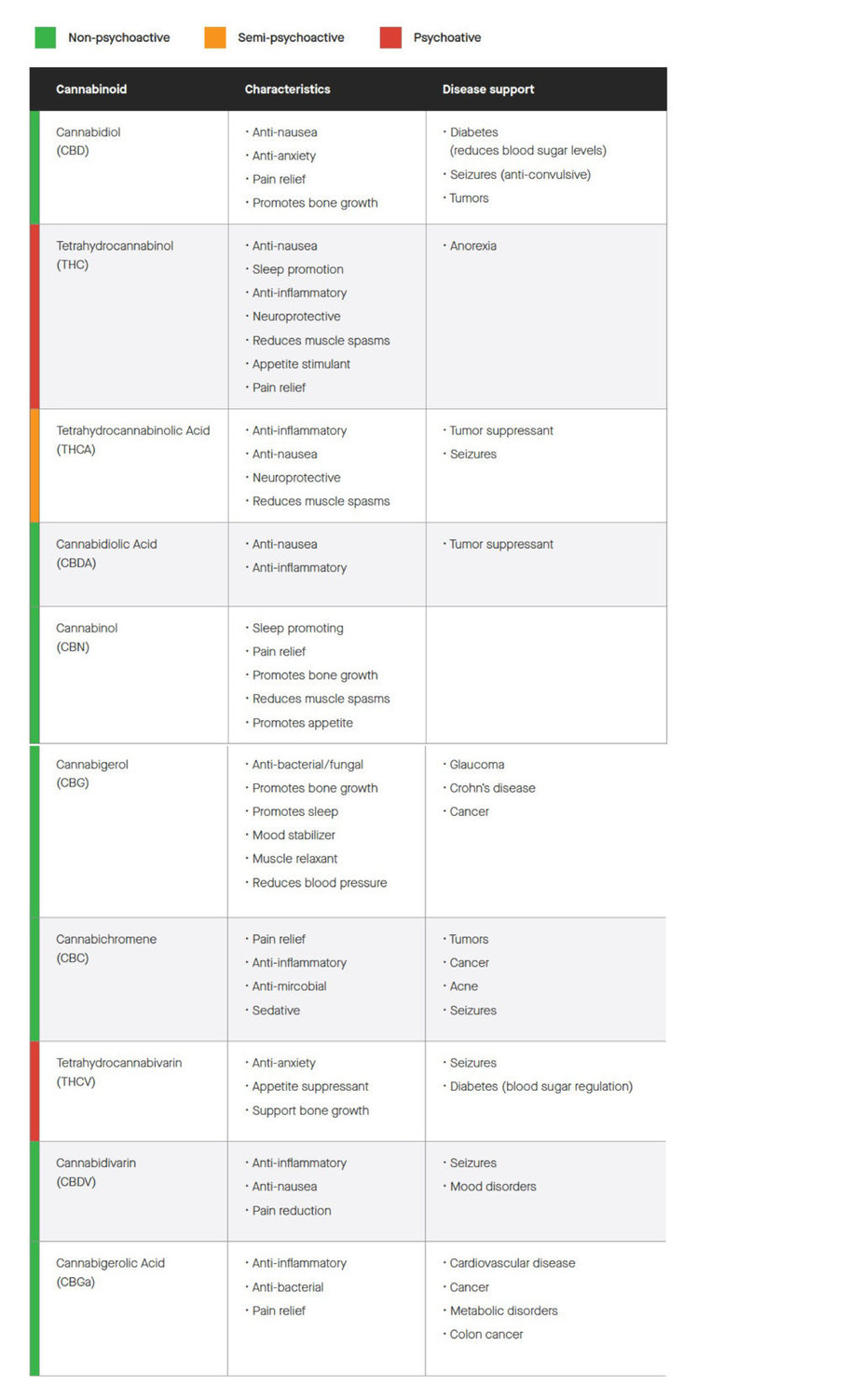CANNABIS THOUGHT LEADERS
Knowledge is power. Arm yourself with the understanding of cannabis, cannabinoids, and how it works with your body.
CANNABIDIOL (CBD)
Cannabidiol, or CBD, is a non-intoxicating cannabinoid known in wellness communities for treating depression, anxiety, and inflammation.
CBD comes from the Ruderalis (Hemp) part of the plant, and works differently than other cannabinoids, by not binding to the human body’s main receptors. Instead, CBD encourages our own receptors to release their own natural cannabinoids, such as 2-AG, the anandamide enzyme and TRPV-1. These enzymes have been shown to regulate pain and decrease inflammation, making CBD an ideal treatment for a wide variety of conditions.
CBD promotes a bodily function called homeostasis.
HOMEOSTASIS
Homeostasis is the process in which the human body creates balance to counter any negative effects that may occur when there is a sudden and stressful change in our environment. For example, when the human body’s glucose levels are too high, the pancreas will release insulin to regulate it. When our glucose levels are too low, our liver converts blood to glucose to keep our glucose levels controlled. This delicate balancing act ensures that glucose levels do not rise or lower to dangerous levels.
By regulating bodily functions such as glucose levels, temperature and blood pressure, it is homeostasis’ goal to ensure the body remains free of disease and sickness.
KEY WELLNESS BENEFITS OF CBD
- Anxiety relief
- Depression relief
- Pain relief
- Reduces inflammation
- Promotes a healthy circulatory system
- Reduces blood pressure
- Anti-convulsant
CBD QUICK FACTS
- CBD usage in Canada up 9.5% since 2017.
- CBD is being used for many reasons, with no one purpose dominating: Applications vary from inflammation (8.5%) to anxiety (7.1%) or depression (4.4%).
- Females most frequently use CBD-oil products, particularly among the 35-44 age group; conversely, males aged 45+ reported consuming CBD far more frequently than younger men.
- The use of CBD-only products gained momentum in Canada in 2019, with CBD oil being used in 9% of medical cannabis consumers.
- Broad perception of CBD as a wellness enhancer is a sign of good things for the future of CBD products in Canada, especially in the advent of its Cannabis 2.0 rollout.
- The product landscape will grow significantly as consumers increasingly embrace wide-ranging products, including formulations with higher THC concentrations in the CBD:THC ratio (e.g., 10:1 or 1:1) and full spectrum blends (oils containing terpenes and cannabinoids including CBD/CBN/CBG).
Source: 2019 New Frontier Data / Statistics Canada, Strainprint

TETRAHYDROCANNABINOL (THC)
Tetrahydrocannabinol, or THC, is the primary cannabinoid that contains the intoxicating and psychoactive effects that cannabis is known for. As a lipid found in the cannabis plant, research shows THC is involved in the plant’s self-defense against becoming a food source for insects, ultraviolet light, as well as protection against environmental stress.
THC works by binding itself to the human body’s CB1 and CB2 receptors. In doing so, it produces the more commonly known effects like hunger, relaxing, and laughter.
KEY WELLNESS BENEFITS OF THC
- Chronic pain relief
- Increased appetite (helpful for HIV and cancer patients)
- Serves as an antioxidant
- Sleep aid
- Anti-inflammatory
- Feelings of euphoria and happiness
- Stress management
- Reduced anxiety

THC QUICK FACTS
- About 5.3 million or 18% of Canadians aged 15 years and older reported using cannabis in 2019.
- 646,000 cannabis users reported trying cannabis for the very first time in.
- Research suggest that first-time users in the post-legalization period are older.
- 22% of Canadian males consume cannabis; 13% of Canadian females consume cannabis.
- The 15-24 age demographic makes up for 30% of Canadian cannabis users.
Source: Stats Canada – https://150.statcan.gc.ca/n1/daily-quotidien/190502/dq190502a-eng.htm
TERPENES
The cannabis plant also contains a series of fragrant oils called terpenes. While their main purpose is to help to ward off foraging insects or invaders, these compounds have also been shown to have additional benefits. For example, one of the more commonly known terpenes, Pinene, is known for its sweet, pine like aroma; however, studies show that when inhaled, it has the ability to help dilate the lungs allowing more oxygen to be received, and in turn improving cellular function.
Terpenes are particularly important in cannabis products because they have been shown to influence the effect that a cannabinoid dosage can have on the human body. For example, specific terpenes allow the human body to maximize the response it has the CBD. If we remove them, we lessen it. Essentially, terpenes are used.
THE ENTOURAGE EFFECT
The Entourage Effects is a well-adopted but unproven theory that states terpenes and cannabinoids work together to synergistically augment the psychological and physiological effects that cannabinoids have on the body.
In essence, the whole is greater than the sum of its parts.
Here are a few ways that different cannabinoids and terpenes can work together:
• A 2010 study showed that patients with cancer pain were given either a pure
THC extract or an extract containing near-equal levels of both THC and CBD—
patients given the THC/CBD combo reported having less pain.
• Mixing the CBD cannabinoid with the terpene caryophyllene (known for its peppery smell) has been used to treat addiction.
• Mixing the CBD cannabinoid with the terpene limonene (known for its citrusy smell) is known to treat anxiety.
• Mixing cannabinoids THC and CBN can aid sleep.
Source: Stats Canada – Leafly

Cannabinoids found in the Cannabis plant

CANNABIS THOUGHT LEADERS
Knowledge is power. Arm yourself with the understanding of cannabis, cannabinoids, and how it works with your body.
What is the endocannabinoid system and how does it work in your body?
What is cannabis and why is it known for its healing and wellness benefits.
What is the difference between THC and CBD and other cannabinoids?
What are isolates and distillates and what is best for me?
From CBD to THC and each product group in between.
One-liners for products and practices. Detailed ingredient info, and more.

